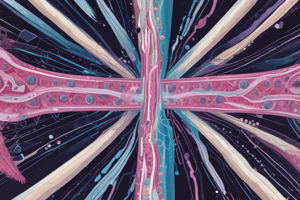Podcast
Questions and Answers
What is the invasion of a host organism's bodily tissues by disease-causing organisms, their multiplication, and the reaction of host tissues to these organisms and the toxins they produce?
What is the invasion of a host organism's bodily tissues by disease-causing organisms, their multiplication, and the reaction of host tissues to these organisms and the toxins they produce?
- Infectious disease
- Disease
- Infection (correct)
- Pathogenicity
What is the term used to describe the ability of a microbe to cause disease?
What is the term used to describe the ability of a microbe to cause disease?
- Pathogenicity (correct)
- Disease-causing ability
- Infectivity
- Virulence
What is the term used to describe the degree of pathogenicity in a microorganism?
What is the term used to describe the degree of pathogenicity in a microorganism?
- Virulence (correct)
- Pathogenicity
- Infectivity
- Disease-causing ability
What is the deviation from a condition of good health and well-being?
What is the deviation from a condition of good health and well-being?
What is the term used to describe a disease condition caused by the presence or growth of infectious microorganisms or parasites?
What is the term used to describe a disease condition caused by the presence or growth of infectious microorganisms or parasites?
What is the reaction of host tissues to the presence of infectious microorganisms or parasites?
What is the reaction of host tissues to the presence of infectious microorganisms or parasites?
What is the primary characteristic of an acute infection?
What is the primary characteristic of an acute infection?
What type of infection develops in an otherwise healthy individual?
What type of infection develops in an otherwise healthy individual?
What is the term for an infection that has spread to several regions or areas in the body?
What is the term for an infection that has spread to several regions or areas in the body?
What category of causative agents includes Prions?
What category of causative agents includes Prions?
What type of infection is characterized by a delayed onset and slow progression?
What type of infection is characterized by a delayed onset and slow progression?
What is the term for an infection that develops in an individual who is already infected with a different pathogen?
What is the term for an infection that develops in an individual who is already infected with a different pathogen?
What is the term for microorganisms that can cause disease?
What is the term for microorganisms that can cause disease?
What happens to a microorganism when it becomes pathogenic?
What happens to a microorganism when it becomes pathogenic?
What is the term for an infection that is caused by microorganisms commonly found in the host's environment?
What is the term for an infection that is caused by microorganisms commonly found in the host's environment?
What is an example of a beneficial microorganism?
What is an example of a beneficial microorganism?
What is pathogenicity?
What is pathogenicity?
What is the study of the transmission of disease?
What is the study of the transmission of disease?
What is the term for a disease that can be transmitted from one individual to another?
What is the term for a disease that can be transmitted from one individual to another?
Which of the following is a non-communicable disease?
Which of the following is a non-communicable disease?
What is the term for an individual who carries an infectious agent without manifesting symptoms?
What is the term for an individual who carries an infectious agent without manifesting symptoms?
What is the term for microorganisms that do not cause disease?
What is the term for microorganisms that do not cause disease?
What is the term for an inanimate object capable of transmitting an infectious agent?
What is the term for an inanimate object capable of transmitting an infectious agent?
What is the term for a disease that is normally found in a certain percentage of a population?
What is the term for a disease that is normally found in a certain percentage of a population?
What is the term for a disease that affects a large geographical area, often globally?
What is the term for a disease that affects a large geographical area, often globally?
What is the term for microorganisms that are small, living organisms not visible to the naked eye?
What is the term for microorganisms that are small, living organisms not visible to the naked eye?
Study Notes
Infections
- Infection is the invasion of a host organism's bodily tissues by disease-causing organisms, their multiplication, and the reaction of host tissues to these organisms and the toxins they produce.
Definitions
- Disease: Any deviation from a condition of good health and well-being.
- Infectious Disease: A disease condition caused by the presence or growth of infectious microorganisms or parasites.
- Pathogenicity: The ability of a microbe to cause disease.
- Virulence: The degree of pathogenicity in a microorganism.
Types of Infections
- Acute Infection: Sudden onset, rapid progression, and often with severe symptoms.
- Chronic Infection: Delayed onset and slow progression.
- Primary Infection: Develops in an otherwise healthy individual.
- Secondary Infection: Develops in an individual who is already infected with a different pathogen.
- Localized Infection: Restricted to a specific location or region within the body of the host.
- Systemic Infection: Spread to several regions or areas in the body of the host.
- Clinical Infection: An infection with obvious symptoms.
- Subclinical Infection: An infection with few or no obvious symptoms.
- Opportunistic Infection: Caused by microorganisms that are commonly found in the host’s environment.
Causative Agents
- Bacteria
- Viruses
- Fungi
- Protozoa
- Helminths
- Prions
Epidemiology
- The study of the transmission of disease.
- Communicable Disease: A disease that can be transmitted from one individual to another.
- Contagious Disease: A communicable disease that is easily spread from one individual to another.
- Noncommunicable Disease: A disease that is not transmitted from one individual to another.
- Endemic Disease: A disease condition that is normally found in a certain percentage of a population.
- Epidemic Disease: A disease condition present in a greater than usual percentage of a specific population.
- Pandemic Disease: An epidemic affecting a large geographical area; often on a global scale.
Reservoir of Infection
- The source of an infectious agent.
- Carrier: An individual who carries an infectious agent without manifesting symptoms, yet who can transmit the agent to another individual.
- Fomites: Any inanimate object capable of being an intermediate in the indirect transmission of an infectious agent.
Human Reservoirs
- Persons with acute or subclinical illness.
- Carriers: during incubation, convalescent carriers, chronic carriers, and intermittent carriers.
Nature of Microorganisms
- Microorganisms are small, living organisms that are not visible to the naked eye.
- Pathogens: Microorganisms that can cause disease.
- Non-pathogens: Microorganisms that do not cause disease; can be beneficial.
Chain of Infection
- (Note: This section is not provided in the original text)
Signs and Symptoms of Inflammation
- (Note: This section is not provided in the original text)
Q&A
- Pathogenicity is the ability of an organism to cause an infection.
- Hypertension is a non-communicable disease.
Studying That Suits You
Use AI to generate personalized quizzes and flashcards to suit your learning preferences.
Description
Learn about the invasion of host organisms by disease-causing organisms, their multiplication, and the reaction of host tissues to these organisms and their toxins. Understand the differences between disease and infectious disease.




